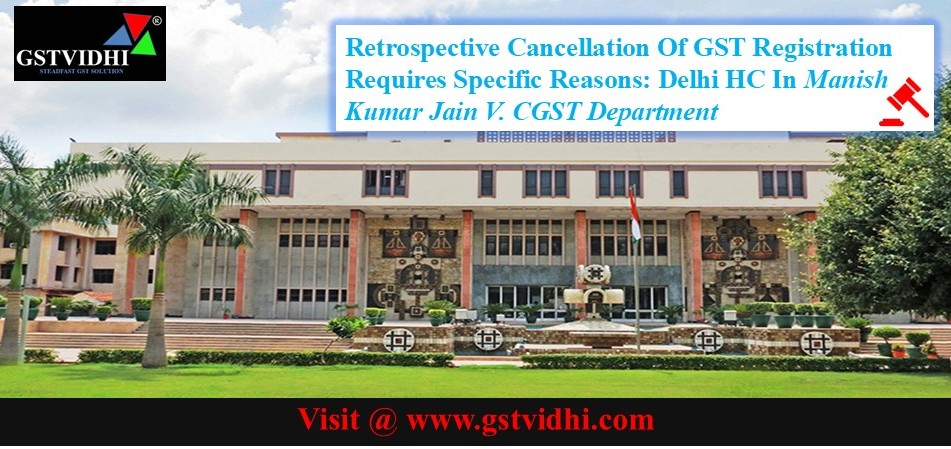
Retrospective Cancellation Of GST Registration Requires Specific
Reasons: Delhi HC In Manish Kumar Jain V. CGST Department
Introduction
In a well-reasoned
decision, the Delhi High Court has held that retrospective
cancellation of GST registration under Section 29 of the CGST Act, 2017
cannot be applied mechanically or without sufficient reasoning. The case
titled Manish Kumar Jain, Proprietor, M/s Independent Chemical Company v.
Superintendent, Central Goods and Services Tax & Another (W.P. (C)
360/2025), challenged the retrospective cancellation of registration from 20
May 2023, even though the Show Cause Notice (SCN) was issued much later on 12
August 2024.
Case
Overview
- Case Title:
Manish Kumar Jain, Proprietor, M/s Independent Chemical Company v.
Superintendent, CGST & Anr.
- Case No.:
W.P. (C) 360/2025
- Court:
High Court of Delhi
- Order Date:
12 February 2025
Background
The petitioner, a
GST-registered service provider involved in infrastructure-related activities,
received a show cause notice (SCN) dated 12 August 2024 for cancellation
of registration under Section 29(2) of the CGST Act. However, the final
cancellation order dated 30 September 2024 backdated the effect of
cancellation to 20 May 2023, nearly 15 months prior to the
notice.
The petitioner challenged
the retrospective effect on the grounds of lack of prior notice, absence
of reasoning, and non-compliance with procedural safeguards under
the law.
Legal Issue
Can GST registration be
cancelled with retrospective effect without:
- Giving prior notice
of such intent in the SCN?
- Recording specific reasons
for invoking such retrospective cancellation?
Submissions
by the Petitioner
The petitioner argued:
1. The
SCN nowhere indicated that retrospective cancellation from 20 May 2023
was being contemplated.
2. The
final order gave no reasoning justifying why the cancellation was being
backdated.
3. Retrospective
cancellation causes serious consequences, including denial of ITC to
recipients, which requires a clear and reasoned justification.
4. The
action was contrary to natural justice and Delhi High Court
precedents, especially:
o Riddhi
Siddhi Enterprises v. CGST, South Delhi [W.P.(C) 8061/2024]
o Ramesh
Chander v. AC, CGST, Dwarka Division
o Delhi
Polymers v. Commissioner, Trade and Taxes
Observations
of the Court
The Court emphasized the
following:
- Section 29(2)
does confer power to cancel GST registration retrospectively, but:
“The mere existence or
conferral of that power would not justify a retroactive cancellation unless
circumstances so warrant.”
- The impugned order must reflect
reasons for cancellation from a past date, especially because it
affects input tax credit claims and tax compliance status.
- Lack of prior disclosure in SCN
regarding retrospective effect invalidates the cancellation.
- The order is vitiated by
non-application of mind.
The Court also relied on
earlier judgments where similar orders had been quashed for being template-based,
unreasoned, and procedurally flawed.
Final Judgment
The High Court held:
“In view of the aforesaid
and in light of an abject failure on the part of the authority to assign even
rudimentary reasons for a retroactive cancellation, we find ourselves unable to
sustain the order impugned.”
Accordingly:
- The writ petition was allowed.
- The impugned cancellation order
dated 30 September 2024 was modified to make the cancellation
effective only from 12 August 2024, i.e., the date of the show
cause notice.
- The stipulation for retrospective
effect from 20 May 2023 was quashed.
Legal
Implications
This judgment reinforces
the following key principles:
1. Retrospective
cancellation of GST registration is not automatic.
2. The
officer must record specific reasons justifying retrospective effect.
3. The
SCN must explicitly state that retrospective cancellation is being
proposed—silence on this point violates natural justice.
4. Taxpayers’
rights, including filing returns and availing ITC, cannot be
jeopardized without due process.
5. Judicial
scrutiny is strict when quasi-judicial orders affect statutory rights
and tax compliance history.
Conclusion
The decision in Manish
Kumar Jain stands as a significant safeguard against arbitrary
cancellation of GST registrations. It upholds that retrospective effects
must be justified with reason, not imposed mechanically. The
judgment contributes to a balanced GST compliance regime, where the tax
authorities are expected to act fairly, transparently, and with due process.
Disclaimer: All the Information is based on the notification, circular advisory and order issued by the Govt. authority and judgement delivered by the court or the authority information is strictly for educational purposes and on the basis of our best understanding of laws & not binding on anyone.
Find the Attachment (Press on Click Here )
Click here